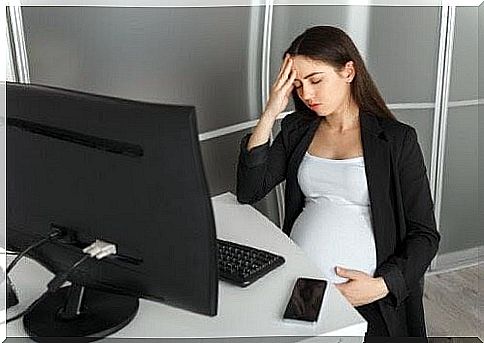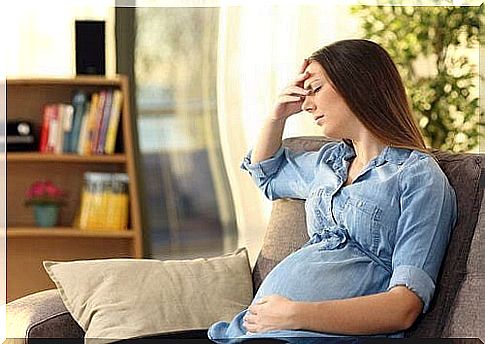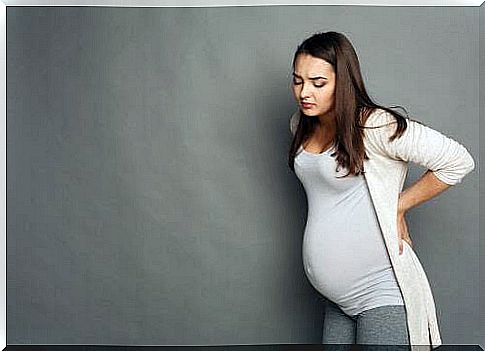Psychological Changes During Pregnancy

Undoubtedly, pregnancy can be a time of great happiness. However, it is important to remember that it is also characterized by emotional fragility and major psychological changes.
Women are susceptible to various psychological changes during pregnancy, including fatigue and depression of varying intensity.
Changes in the body, fear of childbirth and questions about one’s fitness as a mother can create anxiety in those who are expecting a child. Unfortunately, the psychological changes during pregnancy can be intense and often disturbing.
What changes are we talking about? How do they manifest? And what are the recommended solutions? In this article, we answer all of these questions.
Psychological changes during pregnancy
Pregnancy is a time filled with physical and physiological changes. During pregnancy, a woman may also experience mental problems such as anxiety, depression and mental fatigue.
1. Mood swings
For pregnant women, mood swings can occur for no particular reason. They are strongly affected by hormonal changes during the first trimester of pregnancy. These can change a woman’s behavior, how she perceives things and her general mood.
Unfortunately, mood swings during pregnancy can be difficult to overcome, as they usually occur in unusual ways. These may include an aversion to certain odors and foods, as well as vomiting and nausea during the early stages of pregnancy.
This period is usually characterized by questions, doubts about pregnancy, emotions, such as anxiety and fear, which can lead to serious illnesses.

2. Depression
Depression is a disease that affects one’s thoughts, actions and feelings. Some pregnant women are more prone to depression during this time of their lives and experience real suffering.
In addition, hormonal changes during pregnancy often cause depression and anxiety. Tensions in the relationship, combined with a physical illness, can lead to depression in pregnant women.
Depression during pregnancy must be treated as it can cause serious problems such as miscarriage and premature birth. Therefore, it can also cause problems for the baby, such as low birth weight.
3. Anxiety
Pregnancy is not necessarily a time of pure joy. For many women, it is also a period marked by anxiety and fear. A woman’s body undergoes transformations and changes that can disrupt her daily life.
In addition, hormonal changes can sometimes increase one’s emotional instability, which is why some women suffer from anxiety.
As we mentioned earlier, expectant mothers experience intense mental disorders during the last months of pregnancy. This period leads to concerns and many questions, including:
- Fear of miscarriage
- Fear of childbirth
- Concerns about the child’s future health
- Fear of losing the child
- Uncertainty about her ability to be a good mother
In summary, a pregnant woman’s anxiety can cause an increased risk of a premature birth or low birth weight.
As such, it is important to handle this properly during the pregnancy period. Fortunately, in most cases, anxiety does not lead to any serious consequences.
4. Mental fatigue and exhaustion are common psychological changes
Expectant mothers experience changes in their physical and mental condition during all different parts of the pregnancy. These are the most important points in each period:
- First trimester: hormones such as progesterone cause changes in sleep patterns. Nausea and vomiting are also common during this period. Women feel a strong, physiological fatigue, with an irresistible desire to sleep.
- Second trimester: the level of progesterone decreases. Expectant mothers experience less fatigue, nausea finally subsides and sleep disorders are less frequent. However, fatigue can increase in the event of iron deficiency.

- Third trimester: this stage usually causes fatigue to return. Sleep can also be disturbed. At this point, the uterus and baby begin to really weigh down the mother’s body. For these reasons, it is natural to feel tired during the last trimester.
The expectant mother is subject to significant psychological changes during pregnancy. As a result, she needs both physical and emotional support. The role of the partner is important!









